Protolabs, founded way back in 1999, is one of the most robust on-demand manufacturing companies offering a wide range of 3D printing technologies, materials, and services, but it’s not the best at everything. There’s growing competition in the services market. In fact, there are so many alternatives, it can be hard to narrow down the options.
In fact, Protolabs acquired some competition in 2021 when it bought the 3D printing service 3D Hubs. It renamed the service Protolabs Networks in 2023, but whether it’s Protolabs or Protolabs Networks, it’s the same technology, materials, and services.
In this article, we’ll introduce you to the best alternatives to Protolabs — including those that offer lower priced parts. In fact, Protolabs has never topped our lists for affordability in any of our articles where we put 3D printing services to the test, such as “MJF 3D Printing Price Charts: 5 Projects Compared” or “8 Stainless Steel 3D Printing Services Put to the Test.”
Of course, many factors go into making a good 3D printing service or network. To help us narrow down our list of best alternatives, we looked at price, speed of delivery, material selection, technology selection, customer service, and online platform ease of use.
The Best Alternatives to Protolabs
- Best for price: Craftcloud
- Best for free shipping: Xometry
- Best for sustainability: Sculpteo
- Best for instant quotes: Craftcloud
- Best for fast printing: Quickparts
- Best for small orders: JawsTec
There’s no definitive answer to the best platform since each project you print has specific priorities. However, the more you know about alternatives, the easier it will be to select the best fit.
If you’re new to 3D printing, there are some important terms and technologies to understand that will make your work with a service provider much easier.
- If you need a quick plastic prototype, and price and speed are your priorities, you’ll want FDM 3D printing using an economical PLA material.
- If your part needs to impress with injection molding-like quality, fine detail, and smooth services, you’ll want a resin 3D printing technology, such as SLA, LCD, or DLP.
- If your part is going to be used as a tool or take impact, you’ll want it made out of something sturdy, such as carbon fiber nylon, which is usually printed on an SLS 3D printer.
- If you need a part in metal, FMD is “generally” used for just prototypes, but LPBF (also known as SLM or DMLS) is for functional spare parts.
If you’re not 100% sure which technology is the right fit, look for a service that offers a range of technologies, and robust customer service. Plus, be open to the fact that the best option for your part may not actually be 3D printing at all. Perhaps it’s cheaper to CNC machine your part. A good service will know the alternatives.
The material range offered by a service is the next important consideration. The material you choose is vital because it defines the properties of your printed component and often significantly affects the part’s strength, durability, and other aspects. There are actually hundreds of types of filament alone, not to mention 3D printing polymer powders and metals. A good service will make their material offerings easy to understand, but a general rule of thumb is that PLA is for prototypes (it’s a bit brittle) while nylon (or carbon-fiber-nylon) is for end-use parts.
With that, let’s jump in!
Craftcloud
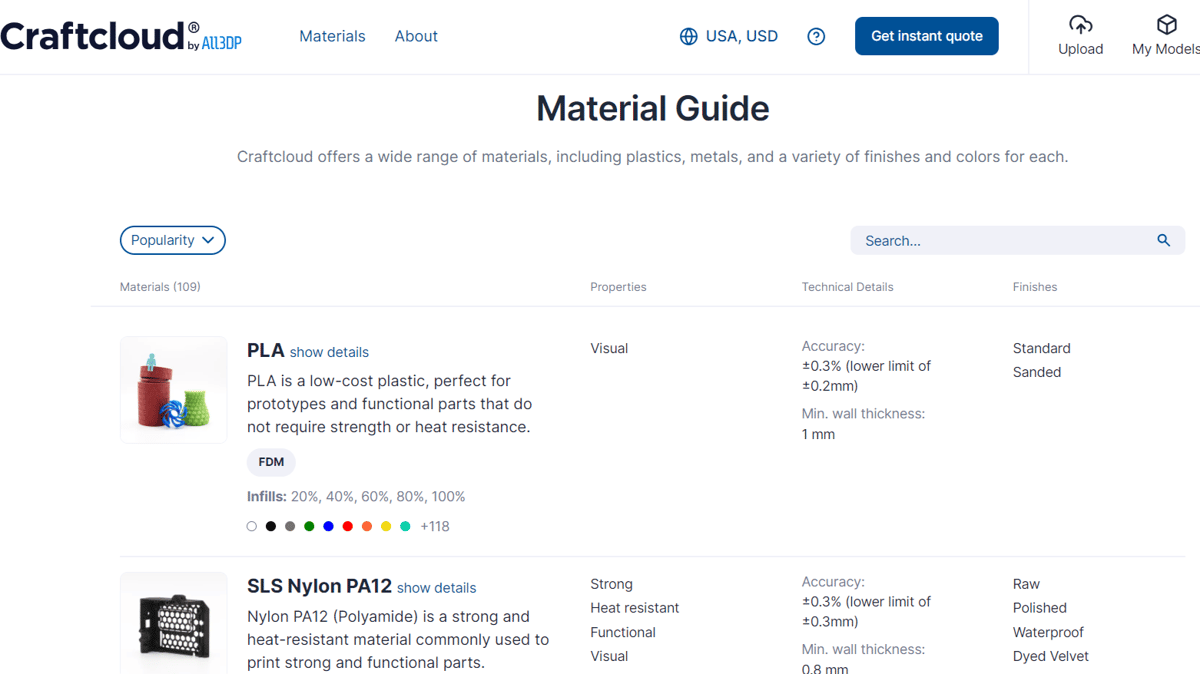
Craftcloud may be the closest service to Protolabs. It also has a large network of 3D printing partners. But Craftcloud enables you to compare prices and services from different manufacturers and find the right one at the right price, delivery time, and location for you. It doesn’t hide who will actually be manufacturing your parts because all partners are vetted for quality. You’ll know if your part is coming from Germany, China, or Minnesota because you get to choose.
Protolabs, although it has a wide network of partners, doesn’t disclose if your part is being manufactured in their facility or a partners’.
Craftcloud offers hundreds of materials and dozens of 3D printing technologies as well as CNC machining and injection molding if you decide that’s the best route for you. You can order your 3D-printed prototypes with Craftcloud and then seamlessly transition to production volumes with injection molding through the same service.
Craftcloud, like Protolabs, offers an instant quote for uploaded digital files and very quick turnarounds.
The main difference between the two services is that Craftcloud can offer much lower prices because of its low overhead. Unlike Protolabs, Craftcloud does not maintain its own manufacturing facilities.
Materialise
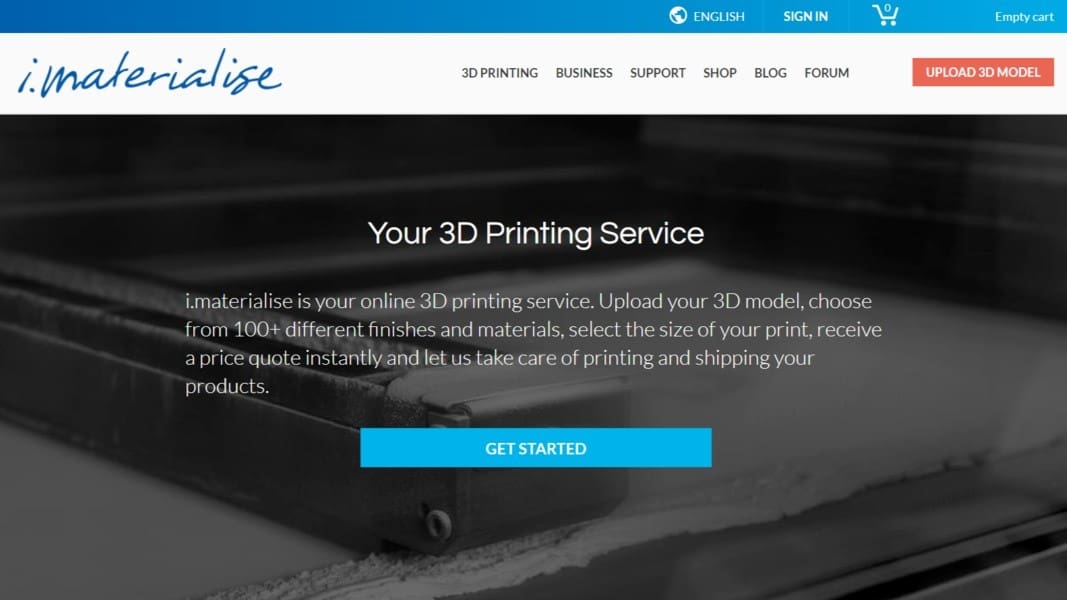
Materialise is a company that offers worldwide, industrial-grade 3D printing on demand. Its services come in two flavors: Materialise OnSite, targeted to industrial clients, and i.Materialise, oriented toward consumers.
Materialise OnSite has the largest fleet of 3D printers in Europe, enabling it to produce parts within 48 hours with their Fast Lane service. With its industrial orientation, OnSite has a higher minimum order quantity, but in turn opens up a world of extra materials and finishes. The service is also designed with customer support in mind, featuring direct contact with in-house engineers and offering eight languages.
i.Materialise, on the other hand, is a more consumer-oriented service. With a lower minimum order, you’re losing material choices and finishes, along with the elevated level of customer support seen in OnSite. While you won’t have engineers on the phone for assistance, you still will have access to the i.Materialise Forum and Help Center. i.Materialise still, however, does make use of Materialise’s industrial 3D printers, so printing quality is by no means lacking.
For both industrial clients and consumers alike, these services offered by Materialise are excellent options for quick turnaround times, especially for European orders.
Sculpteo
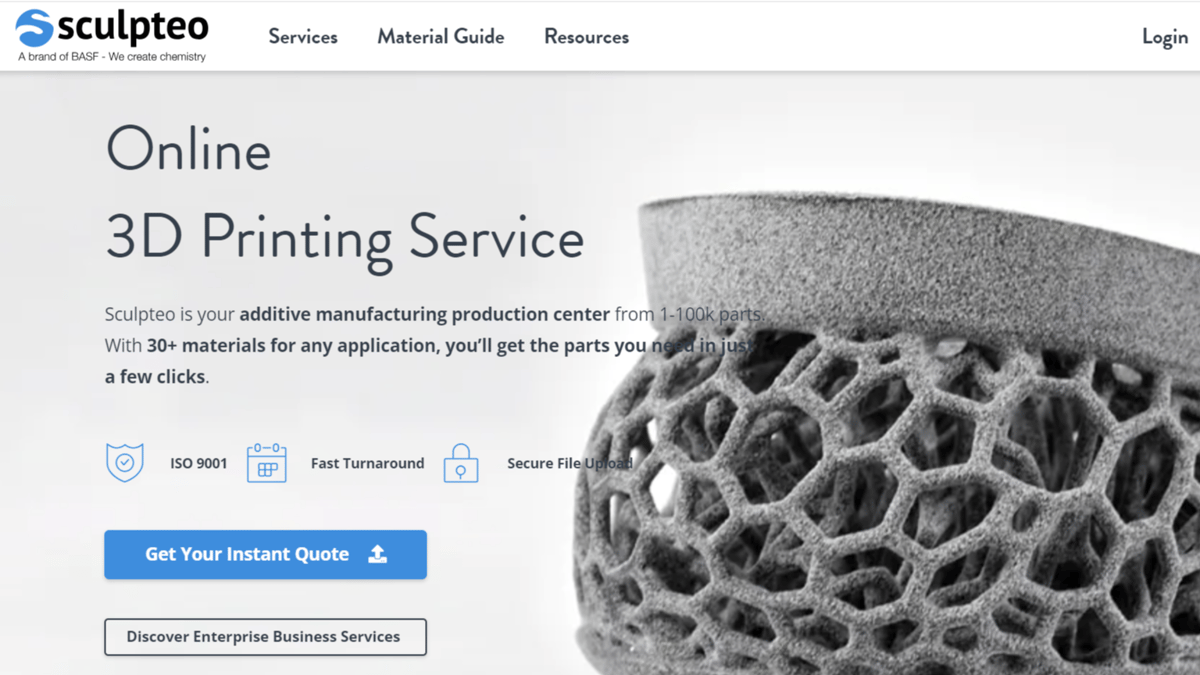
Sculpteo, a Craftcloud partner, delivers prints from industrial-grade machines to a worldwide market. In keeping with its competitors, Scuplteo offers a wide range of materials and a number of tools to analyze, repair, and optimize models for the best possible experience. It also offers an online marketplace for individuals to sell designs to consumers.
Something Sculpteo offers that you won’t find at Protolabs is a recycling service for your parts printed in nylon PA11 and PA12. The recycled material will then be used for injection molding and the production of new items with great technical specifications, giving your parts a second life. Sculpteo is also our top pick for sustainability because it give you the option to minimize the cost and environmental impact of your small part production with its FlexEco program. Rather than printing everything at once, this approach spreads batch production over several weeks to use unused space in Sculpteo’s daily print jobs. The result is more items being printed simultaneously while reducing material waste and energy consumption.
If you happen to be looking to laser cut wood, this is another service you’ll find at Sculpteo and not at Protolabs.
Xometry
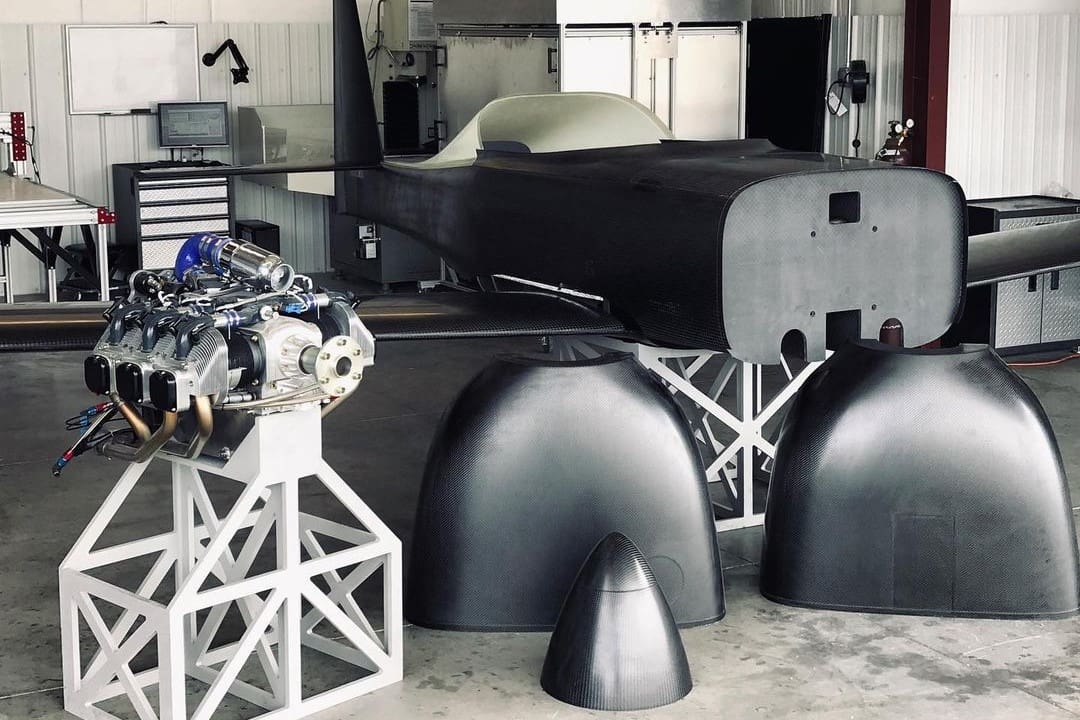
US-based Xometry is another well-established player in the manufacturing service space, offering services including 3D printing (in plastic and metal, of course), CNC machining, and injection molding, among many others. Their list of clients includes the likes of General Electric, BMW, and NASA. Given that, you’re likely in good hands.
In comparing Protolabs network to Xometry’s network, the later may win out with “over 10,000 manufacturing shops across the globe,” it say. The advantage of this is that even if you throw a massive order at it, you can still expect quick turnaround.
Xometry also lists the specific 3D printing industrial machines that it uses, so if you have a Carbon M2 or a Nikon SLM Solutions 125HL, but need extra capacity, you can send Xometry your exact print perimeters to get the same quality you get in your own shop.
Another distinguishing feature of Xometry is the fact that it’s already integrated into the supply chains of federal agencies, large defense contractors, and aerospace manufacturers. Protolabs is ITAR registered but Xometry takes it a step further with a dedicated security operations team that can conduct real-time security compliance checks on your digital files and finished parts.
Quickparts
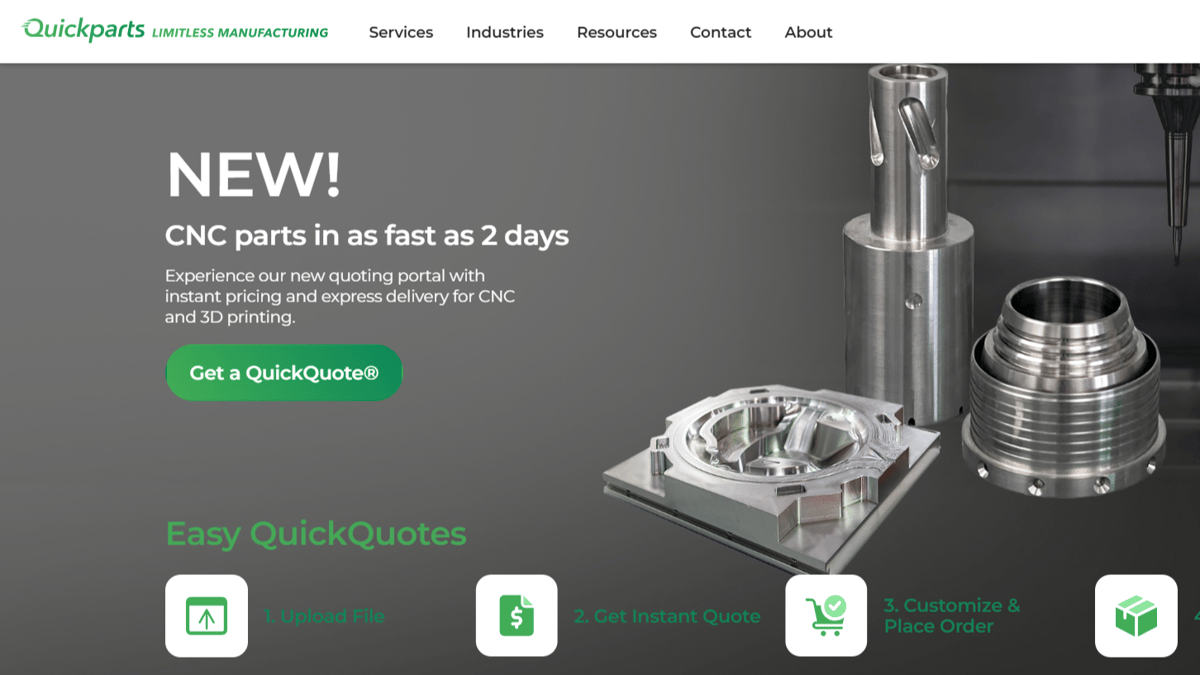
Quickparts, as the name implies, is a global contract manufacturer with a focus on speed. The company offers an express same-day and one-day service. For same-day parts, the company offers additive manufacturing using selective laser sintering (SLS) technology in durable nylon. For parts the next day, there are resin 3D printing options for parts in photopolymers. By contrast, the fastest customers can have their parts injection molded is five days, and three days for machining parts.
Quickparts offers traditional manufacturing processes alongside 3D printing. They offer a variety of 3D printing technologies on a wide range of printer brands to cover everything from prototypes to low-volume production. The service is a combination of in-house production and global manufacturing partners.
The Quickparts staff can help you select materials and even determine if additive or traditional methods are best for your project.
Setting Quickparts apart from Protolabs is probably their experience with large-scale manufacturing. The company specializes in helping companies scale-up their production and can implement 3D printing as a bridge manufacturing solution.
Stratasys Direct
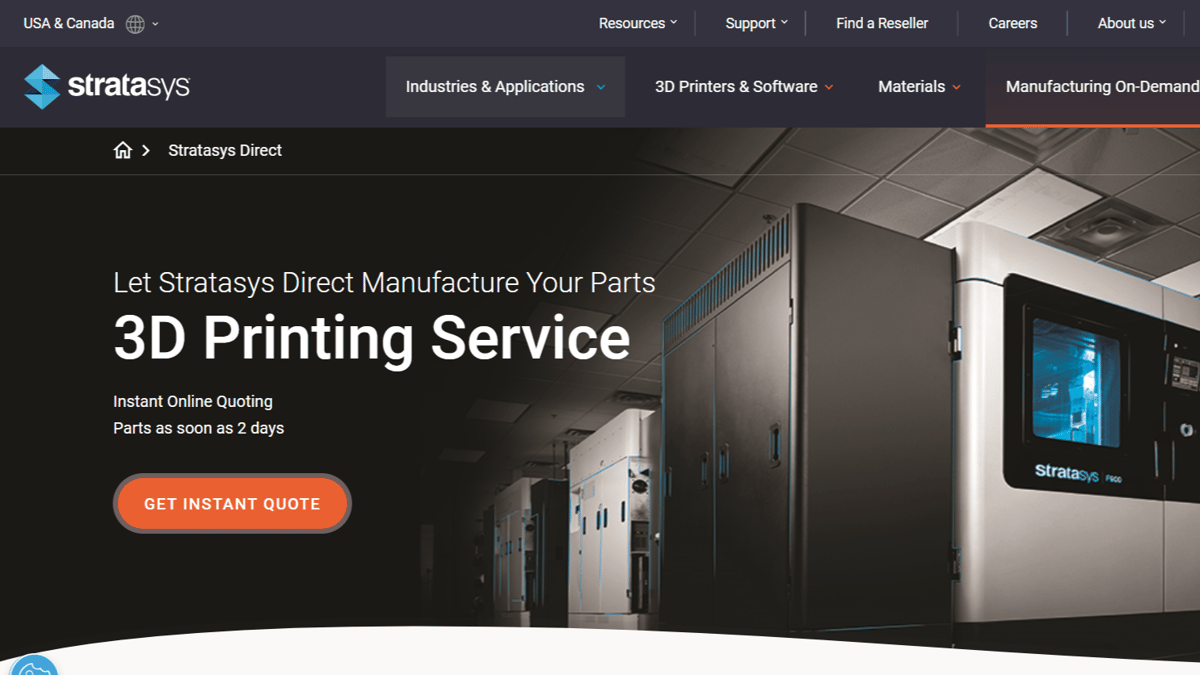
Stratasys is a leading manufacturer of industrial 3D printers and has created its own Stratasys Direct manufacturing service, where they use Stratasys 3D printers. This service is backed by a wealth of 3D printing experience and a dazzling range of materials, all of which are clearly explained on its website.
Stratasys offers a thorough design services program and direct contact with engineers who can guide you through the adoption process. The idea is that, perhaps, you’ll love the parts from Stratasys machines so much you’ll want to buy your own.
This brings us to the main difference between Stratasys Direct and Protolabs: the machines. Stratasys has a proprietary technology called PolyJet that can 3D print is full, vibrant color. Protolabe does offer some PolyJet, but only in limited colors. If you’re looking for all that PolyJet can offer, there’s no better solution than Stratasys.
FacFox
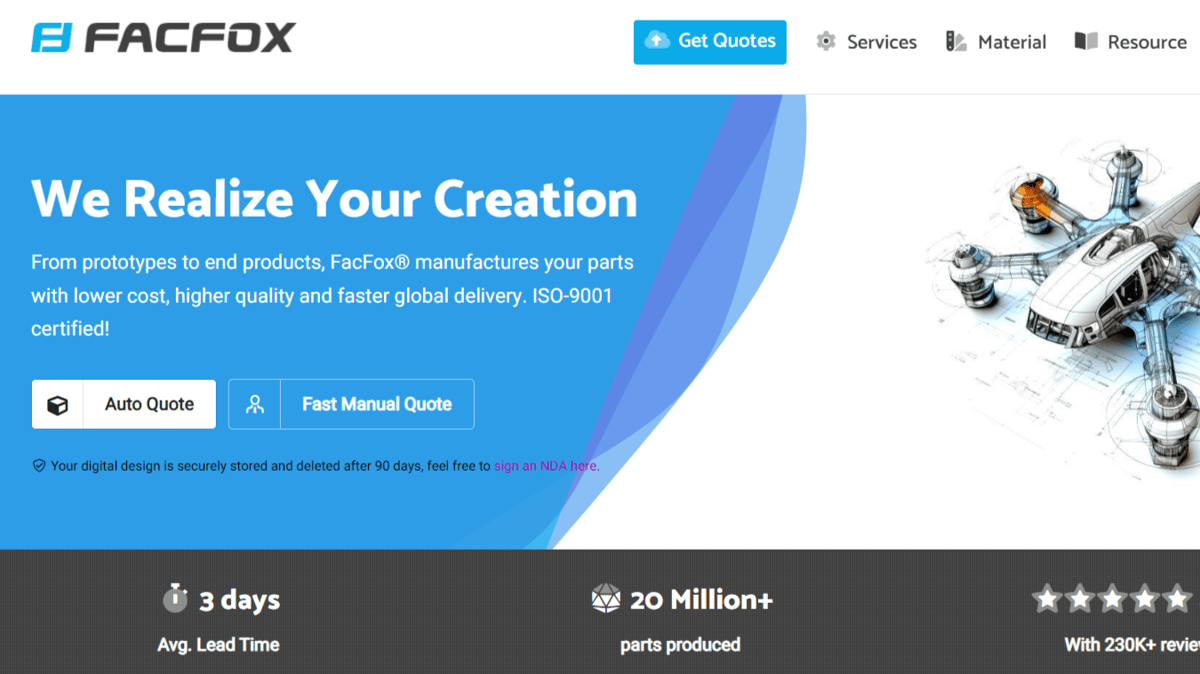
Offering a wide variety of manufacturing services, FacFox, a Craftcloud partner, is one of China’s leading on-demand print services. The company tailors its services to several industries, including architecture, medical, retail, and design.
A simple online interface lets you quickly upload models, which will then be checked for printability (and automatically repaired if not) before payment. Live tracking of the print’s progress is a nice touch, and competitive international delivery often makes it a cost-effective alternative to some of the perhaps better-known services on this list.
So if you’re looking to 3D prints in Asia, FacFox has Protolabs beat.
JawsTec
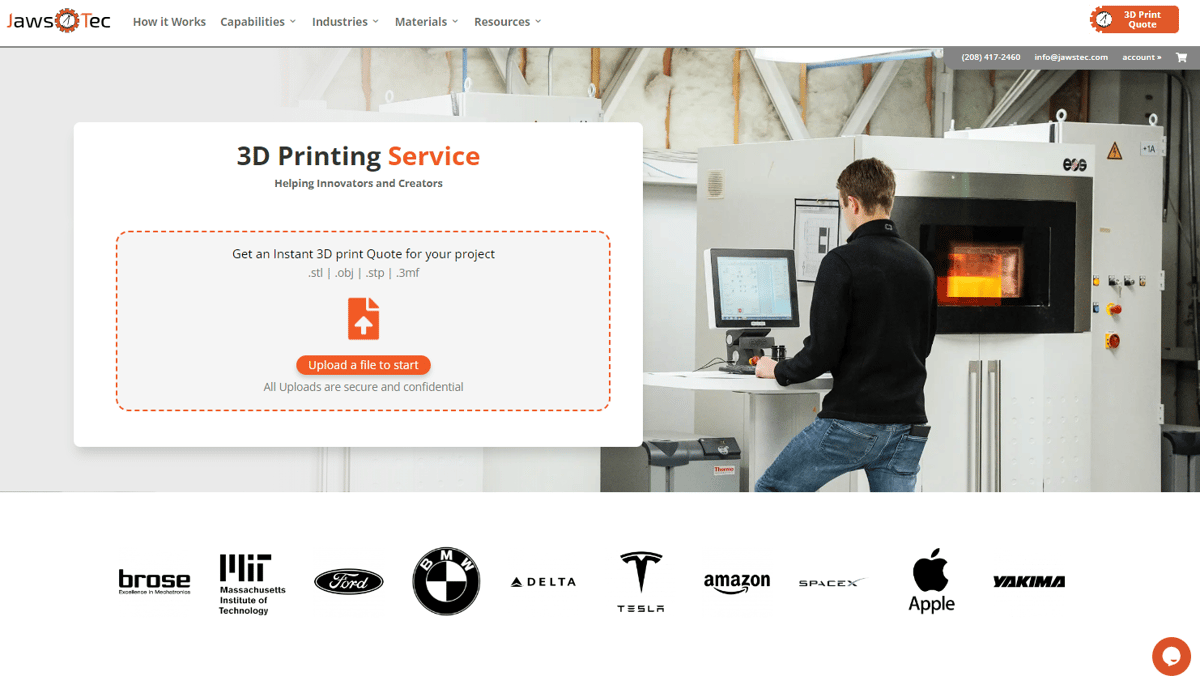
Idaho-based contract manufacturer JawsTee is part of HP’s Digital Manufacturing Network offering parts on the HP Multi-Jet Fusion 4210 and 5210 machines. So if HP Multi Jet Fusion parts are your focus, JawsTec is your shop. It’s also
If you’re not sure if 3D printing is for you or how to get started, you can avail yourself of JawsTec’s engineering and design services. They’ll assess your project feasibility, product design and validation, process optimization, production streamlining, and, basically, all you need to get your project off the ground.
Another bonus at JawsTec is the streamlined instant quote service. It took us about 5 seconds to get a quote on our MJF part including all of the color and finish options, plus we didn’t have to create an account.
Plus because there’s no minimum order number or minimum oder dollar value at JawsTec, start-ups can become manufacturers with virtually no investment, unlike with other manufacturing methods, such as injection molding that require costly molds.
License: The text of "8 Protolabs Alternatives We Recommend" by All3DP Pro is licensed under a Creative Commons Attribution 4.0 International License.

